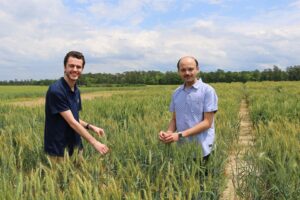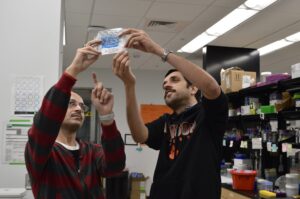Sachin Rustgi directs the molecular breeding program at Clemson University’s Pee Dee Research and Education Center in Florence, South Carolina, where his work in the Advanced Plant Technology Program seeks to improve the nutritional profile of small grains and legumes.

Rustgi’s small grains and legumes research targets antinutritional elements. His team is developing peanut and wheat varieties with reduced allergenic proteins.
“Wheat and peanuts are major sources of energy and protein for millions, yet they also rank among the top food allergens,” Rustgi said. “Our goal is to breed safer crops for people affected by foodborne disorders.”
A native of Uttar Pradesh, India, where wheat is a primary crop, Rustgi is no stranger to the impact of foodborne illnesses. He noted that wheat contains gluten, a trigger for celiac disease—a condition affecting about 1.04% of India’s population and roughly 3.2 million Americans. Peanut allergies impact more than 6 million people in the United States.
Rustgi emphasizes student involvement in his research.
“I work with students to build a strong foundation in plant breeding, research techniques and ethical practices,” he said. “We combine basic science with practical applications to benefit both producers and consumers.”

Graduate student Zachary Jones is collaborating with Rustgi on a project to develop wheat with lower levels of gluten proteins. Jones said he believes what he has learned under Rustgi‘s guidance will help him in his career.
“Dr. Rustgi has helped shape me into a well-rounded scientist who can take on complex challenges in molecular biology and use the problem-solving skills I have strengthened under his tutelage to achieve my objectives and reach my career aspirations,” Jones said. “One of the most valuable lessons I have learned from him is the importance of thinking critically and not limiting myself to a single discipline. Instead, incorporate knowledge from multiple aspects of science in my work to help solve challenging problems.
“He regularly encourages me to use ideas from my medical background or other areas and apply them to plant sciences to work towards developing innovative solutions to improve human health.”

In another study, researchers in Rustgi’s lab compared gluten-free products with their gluten-containing counterparts. Graduate student Tariq Alam and postdoctoral researcher Gautam Saripalli worked with Rustgi on a study that found, on average, gluten-free products available to consumers in the U.S. contained significantly less protein and more sugar and calories than their counterparts that contain gluten. They also found gluten-free products tend to be more expensive than those containing gluten.
The researchers believe their findings may be used to help individuals with celiac disease, wheat allergy and non-celiac wheat sensitivity, as well as those who choose a gluten-free lifestyle based on personal preference rather than medical necessity.
While research is important to humans and the planet, Rustgi also believes that research must go together with public awareness.
“Scientific breakthroughs should be paired with an understanding of public opinion and ethical responsibility,” he said. “I strive to instill these values in my students.”
In addition to studying wheat and peanuts, the researchers are also exploring the use of nucleic acids in managing the parasitic fungi of Armillaria species in peaches and aphids in sorghum.
Rustgi’s research includes creating cotton genotypes with reduced regrowth after defoliation and enhanced lint yield. Cotton is a perennial plant with a growth habit and structure that supports regrowth after defoliation, which impacts productivity, profitability and management strategies for production.
He and his team are determining how to develop an annual variety that can produce higher-yielding cotton with high-quality fiber.
The researchers are looking at how plants use environmental and hormonal cues to transition from vegetative growth to reproduction.
In addition to being director of the molecular plant breeding program at the Pee Dee REC, Rustgi is a faculty scholar for the Clemson School of Health Research and Center for Human Genetics. He is also an adjunct associate professor for the Department of Crop and Soil Sciences at Washington State University, and the Department of Genetics and Plant Breeding at Chaudhary Charan Singh University in Meerut, India.
